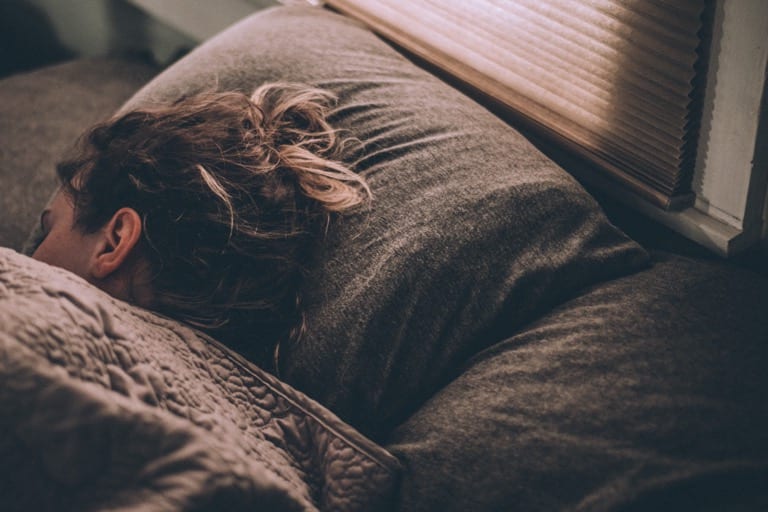Newborn babies require round-the-clock care, and anyone who tells you otherwise is selling you something. So, short of hiring a full-time nanny to care for your child(ren), you are going to be sleep-deprived. You will be bleary-eyed and have dark circles. You just need to accept it.
For the first three or four months of life, a baby’s internal clock isn’t running yet, and that baby honestly couldn’t care less about day versus night. All she knows is that she’s hungry and/or poopy every two to four hours, and she needs your help. After a few days, you’ll probably feel like you’re running on fumes, and you still have months of tiredness ahead of you. You’re going to have to work to get as much sleep as possible.
Why is Mom’s sleep so important?
Scientists show that getting less than five hours of sleep has many negative effects on the brain, including decreased processing speed and decision-making skills. Getting enough sleep isn’t a luxury – it’s a necessity to keep you and your baby safe and healthy. Here are a few reasons why lack of sleep could be hazardous to your health:
Driving: The AAA Foundation for Traffic Safety did a study that found that people who slept between six and seven hours per night doubled their risk of getting in an accident. If that’s not startling enough, the study further showed that habitually getting less than five hours quadrupled a person’s risk of getting into an accident. As a new mom, you’re almost guaranteed to fall into the five-hours-or-less category, and those first few months of life require a lot of appointments. You simply can’t risk impaired judgment with such precious cargo in tow.
Memory: When did you feed baby last? Did you give her her medicine? Where did you put the keys? Did you call the doctor to set up that appointment? Did you leave the oven on? When was her last diaper change? There is so much to remember when you’re a new mom, and tiredness inhibits your memory. Good sleep will help you remember things better, but also check out this post for some apps to help you keep track of things.
Mental Health: There is a link between postpartum depression and sleep deprivation. While many factors influence postpartum depression, lack of sleep appears to exacerbate depressive symptoms in both newborn mothers and fathers. Since sleep deprivation and postpartum depression are likely bidirectional – meaning that they both aggravate each other – it’s hard to determine the chicken or the egg, but it’s still bad news.
Physical Health: Long-term lack of sleep can also take a significant toll on your physical health. It can increase your risk of heart disease, diabetes, and high blood pressure. Tiredness is also linked to mood swings, weight gain, and difficulty balancing.
So what are you supposed to do about it?
It’s not like you can just not get up with the baby when she’s hungry in the middle of the night, but our certified sleep consultants have put together a few tips for adapting your lifestyle to work in a few hours of sleep here and there.
1. Adjust Your Expectations
We get it: you want to be a “good mom” with a spotless house and a pot roast on the table by 5:30. While that may be something a “good mom” does, the “best mom” keeps her children alive and happy without sacrificing her own mental and physical health. Sure, there’s an element of selflessness that goes into being a mother, but you’ll find that you and your children are much happier and healthier when you adjust your own expectations. As one very wise Disney princess said, you’ve got to learn how to “let it go!”
If you’re a list-making kind of person, start each day with a list of your priorities and remember that you might not reach your goals. In those early days after having a baby, your only goals may be to take a shower, eat your vegetables, and not cry when the Pamper’s commercial comes on. Give yourself some grace, for Pete’s sake! Remember, if you wouldn’t tell your best friend the things you’re telling yourself, you shouldn’t be telling yourself those things.
Leave the laundry until tomorrow. Take a deep breath. Go wash your face. And go to sleep.
2. Sleep When Baby Sleeps
This is potentially the most annoying piece of advice new mothers get both before and after the baby arrives. “How am I supposed to nap when the house looks like a tornado hit it, I’m in the same spit-up covered shirt I wore yesterday, flakes of mascara are crusted around my eyes from who knows when, and I haven’t showered in three days???” We know the feeling.
As tricky as it is to implement this advice, it still has a lot of truth behind it. As a new mother – whether you’re a biological, foster, or adoptive mother – you are more tired than you’ve ever been in your life. There may have been times when you thought you were tired before. Maybe you pulled all-nighters in college, or stayed up late chatting with friends, or you got up really early to catch a flight – you probably felt pretty tired after those experiences. But let’s be frank: all of your previous experiences pale in comparison to being a newborn’s mother.
It can be especially difficult to squeeze in a nap when you have other young children in the home that aren’t on baby’s schedule. But you need to find a way to make it work. If that baby is sleeping, you need to find a way to rest, even if it’s only for 20 minutes at a time.
3. Trade-Off/Enlist Help
There is absolutely nothing shameful about getting help during those first few months. Hire a housekeeper or a nanny if you can afford it, or ask a friend to come over during the day so you can get some uninterrupted shut-eye. Your partner is also tired beyond reason. Communicate when you can trade off kid-watching responsibilities so both of you can take good naps. You will probably both still be sleep-deprived, but it won’t be as bad as it could be.
Your little bundle of joy will need you a lot those first few months, but things should gradually get better as she gets some developmental milestones under her belt. You’ll still be tired, but by staying on top of your sleep, you’ll be happier and healthier.
And if you got your baby into a good groove but find that she is now experiencing sleep regression, contact our infant sleep coaches for expert guidance. We have helped thousands of families sleep well, and we’re ready to do the same for you.
Video



